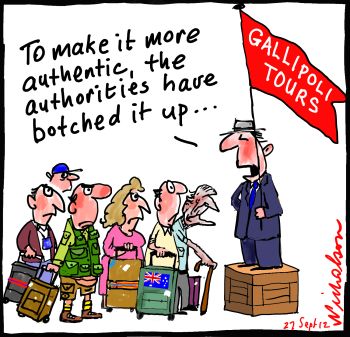
The reason why ANZAC Day is so important to the nations of Australia and New Zealand was that it was the day we became aware of exactly how little regard we were held by the British commanders. It was therefore the day we decided to look to ourselves for self-regard: the birth of the national consciousness.
This is why ANZAC Day is celebrated to the degree that it is in both New Zealand and Australia even today, a century after the landings at ANZAC Cove.
The day marks the moment that we decided we were good enough to stand on our own merits as New Zealand and Australia, and not merely as colonies of Britain, because the British did not hold us in the regard we deserved.
The difficulty is this – a century later, our own leaders, despite being elected from among ourselves, treat us with equally little regard. In fact, our own leaders treat us so poorly that we’re now doing worse than many of the countries we have defeated in war within the past century.
Germany and Japan today both have a higher standard of living than the Anglosphere – their defeat in World War Two made it possible to clean out the entrenched corruption in the political systems of these countries, laying the foundation for socio-economic success.
Contrast that to the West, where the victory of World War Two was taken as a sign that God had blessed us. Not only were we correct, but our entire social order was perfect, right down to the degree to which labour relations favoured capital interests.
The symbol of ANZAC Day is the poppy, the reason being that the poppy is used to make morphine, and morphine was raised to an almost holy status after World War One because for an injured soldier its administration was like a gift from heaven.
For the soldiers who risked so much to bring freedom to people, and who felt first-hand the degree to which medicine can prevent human misery, it must be a bitter pill to swallow that the governments they fought for are putting their descendants in cages for exercising their right to use medicinal plants.
In much the same way that morphine brought relief to those whose bodies had been shattered by bullets and shrapnel, other plant medicines bring relief to those whose minds have been shattered by abuse and neglect.
Cannabis is now legal in 29 American states as a recognised medicine, including for post-traumatic stress disorder, the mental illness that the ANZACs would have called shellshock. But the New Zealand Government will not even discuss changing the cannabis laws here.
MDMA is also being currently trialled after showing promise in treating PTSD, psilocybin is currently being trialled after showing promise in treating death anxiety, ibogaine is currently being trialled after showing promise in treating drug addiction and ayahuasca is currently being trialled after showing promise in treating depression. But anyone using any of these plant medicines in New Zealand risks getting put in a cage for many years by the Government.
It’s hardly plausible that the men that signed up to fight Hitler did so to protect a political system that would put their grandchildren in cages for using medicinal cannabis. Yet, here we are. We would have more freedom today if the ANZACs had shot a few of their own politicians.
The lesson of ANZAC Day is this. Never, ever follow the dictates of people who claim to rule you and who claim to be in charge of you, no matter how urgent the need is claimed to be, no matter how many flags they wave, no matter what authority they claim to be speaking with, no matter how malicious the enemy is claimed to be, no matter how much jeering, threatening, mocking, insulting and coercing they do.
Anyone who is not willing to treat you as an equal is your enemy.



